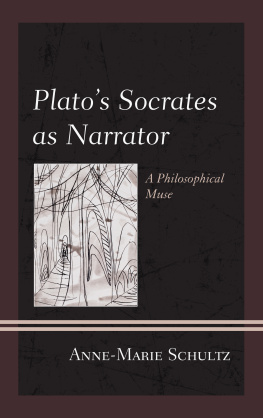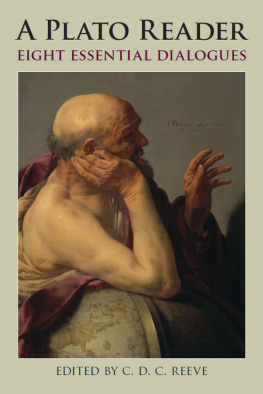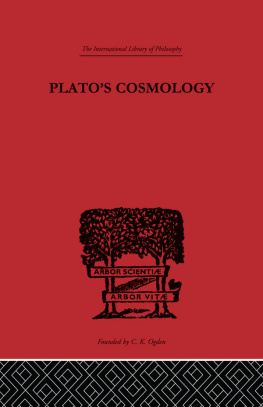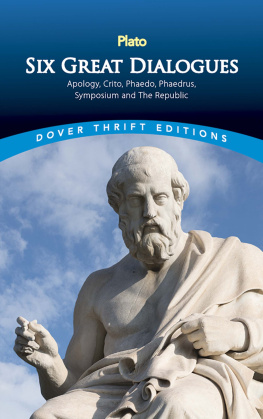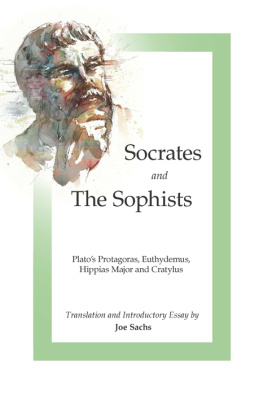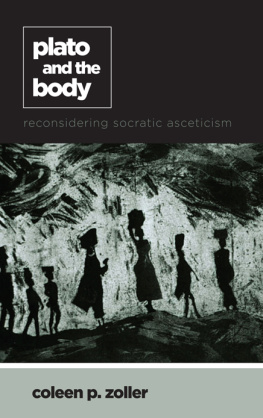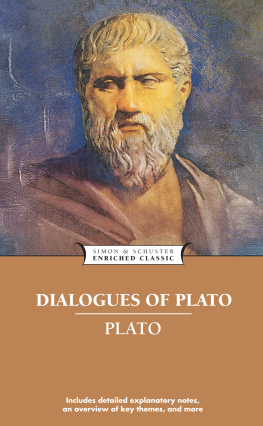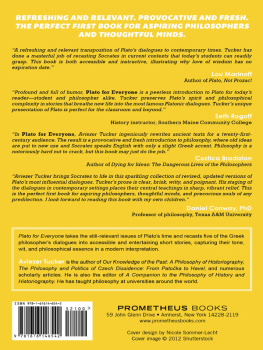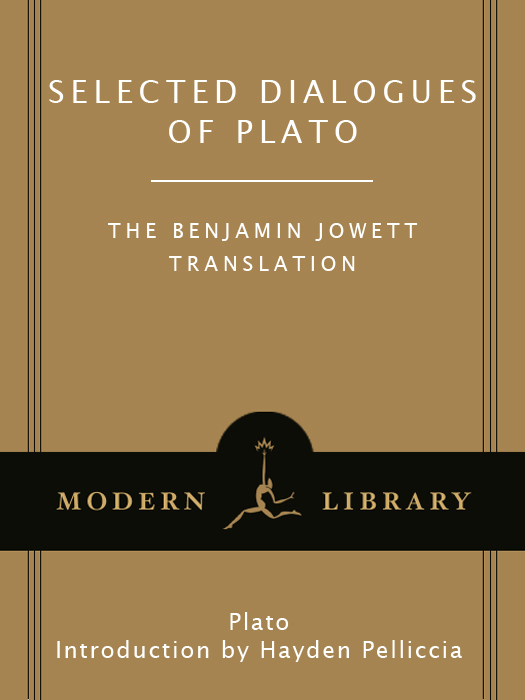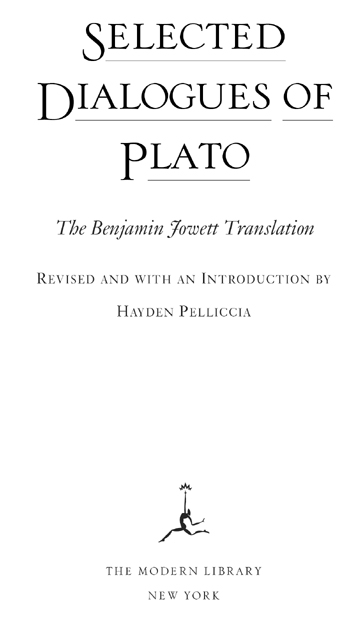A Modern Library eBook Edition
Copyright 2000 by Hayden Pelliccia
All rights reserved under International and Pan-American Copyright Conventions. Published in the United States by Modern Library, an imprint of The Random House Publishing Group, a division of Random House, Inc., New York, and simultaneously in Canada by Random House of Canada Limited, Toronto.
M ODERN L IBRARY and the T ORCHBEARER Design are registered trademarks of Random House, Inc.
This work was originally published in 2000 by Modern Library, a division of Random House, Inc.
LIBRARY OF CONGRESS CATALOGING-IN-PUBLICATION DATA
Plato.
[Dialogues. English. Selections]
Selected dialogues of Plato: the Benjamin Jowett translation/revised and with an introduction by Hayden Pelliccia.
p. cm.
eISBN: 978-0-307-42361-0
1. Philosophy. I. Jowett, Benjamin, 18171893. II. Pelliccia, Hayden.
III. Title.
B358.J82 2000
184dc21 00-30552
Modern Library website address: www.modernlibrary.com
v3.1_r1
P LATO
Plato was born in Athens c. 429 B.C. His father and mother, Ariston and Perictione, were both members of notably illustrious and aristocratic families. His stepfather, Pyrilampes, was an associate of the great democratic statesman Pericles (c. 495429). His cousins Critias and Charmides, on the other hand, were heavily involved in antidemocratic activities, and both participated in the violent, unscrupulous, and thankfully short-lived oligarchical regime (The Thirty) that came into power after Athens final defeat by Sparta in the Peloponnesian War (431404). The conflicts that wracked Athenian society during this entire period were thus embodied in Platos own family life, a circumstance that undoubtedly contributed to his fascinated disillusionment with politics and political systems.
As a young man Plato became a follower of the philosopher Socrates. After the latter was put to death by the Athenian state for the crime of impiety (399 B.C.), Plato withdrew from Athens for a time, and from any form of civic career forever. Upon his return to Athens he established, in a grove outside the city walls, a philosophical school that took its name from that of the grove in which it was located, the Academy. Platos teaching here, about which we know little, was combined with prolific writing, about which we know a great deal: his written works have formed the foundation of Western philosophy for the twenty-odd centuries since their composition.
Platos teaching must have been similarly compelling: among the pupils who came from all over the Greek world to study at the Academy was Aristotle (384322 B.C.), the only philosopher who can claim to have exerted an influence upon subsequent thought comparable to that of his masters.
Plato died in Athens in 347 B.C.
I NTRODUCTION
Hayden Pelliccia
Having the task behind me, I can propose with some seriousness what I did not begin to guess when it still lay ahead of me: namely, that revising someone elses translations of works of Plato is not much less demanding than translating them afresh. That raises the question, Why stick with Jowetts old versions at allwhy not simply produce new ones? I have consulted many of the translations produced since Jowetts, many of them up to date in every possible sense, and Jowetts, in my judgment, remain superior, in the most important respects, to them all. Jowett has a better command not just of English prose style, but of English prose styles, and that gives him a great advantage in rendering the language of a master of variation like Plato. In a work like the drunken Alcibiades, was reckoned by his contemporaries to be the most all-around brilliant member of his generation. (The longest speech is by Socrates, on whom see below.)
Jowetts successors, especially the more recent ones, are hampered by the contemporary abhorrence of any style other than the spontaneously informal and colloquial (which is not the same thing as the plain style)though Jowett may sometimes have erred too much in the other directions. Modern tastes seem to coerce modern translators into adopting one or the other of two approaches only: the uniformly casual and colloquial, or the uniformly, and dryly, literalneither approach likely to produce a particularly happy version of Platos more literary works, which are those preeminently on display in this edition. Jowett, in comparison, had much greater freedom than we dowhen Platos speakers soar, Jowett often succeeds remarkably well in soaring with themand we can follow along without too much embarrassment: after all, we expect such flights in nineteenth-century writers. Furthermore, I suspect that there are many besides me who actually prefer to think and find that the speech of such personages as Plato depicts might be more stylish, subtler, richer, and more accomplished than what we are used to hearing from our own friends and selves.
The revisions I have attempted are of two kinds: first, I have incorporated scholarly advances made in the establishment and interpretation of the Greek text since Jowetts time, in which category I include changes imposed where I disagree with Jowetts interpretation or think he made a mistake (sometimes Jowett changed the order of sentences, for example; I have tended to restore the order of the original). Second, I have removed archaisms or affectations is rendered by Jowett Concerning the things about which you ask to be informed I believe that I am not ill-prepared with an answerwhich manages to be both stilted and a little arch in the high Victorian Oxford manner. The Greek, on the other hand, is somewhat informal and quite intimate; we are clearly overhearing a conversation that is already in progress, and is conducted among friends; the speaker, Apollodorus, uses an idiom that, while not quite diffident, is urbanely removed from the self-assertive: Actually, it turns out that I am quite well up on the matter you are asking about. That is a fairly radical departure from Jowetts text. It must be emphasized, however, that I have not found the need for such significant tampering to be spread evenly through the works translated here: some passages have been subjected to extensive adjustment, others have been barely touched.
At this point, a word about sex would be appropriate, or at least about sex as it connects in a translators mind to questions of language and style. Many of the changes I have made in revising Jowett comply with changes in taste that have occurred between Jowetts time and our own, and the public discussion of sex is a matter about which tastes have changed rather dramatically. Since readers can be assumed to have an interest in this subject, it seems worth getting it out in the open.
consistently urbane and, in many instances, amusedly detached.
The translation of passages that treat sexual matters invites discussion of the sexual matters themselves. Many readers of the appear, in the aggregate, to go even further, and to exhibit an even greater receptivity, to the point of avidity in several cases.)

The five works assembled here have been chosen to serve as an introduction to Plato, and in particular to the more literary side of his genius. The volume also forms a good introduction to Platos representation of his teacher Socrates, the figure who takes the dominant role in the majority of Platos works.


